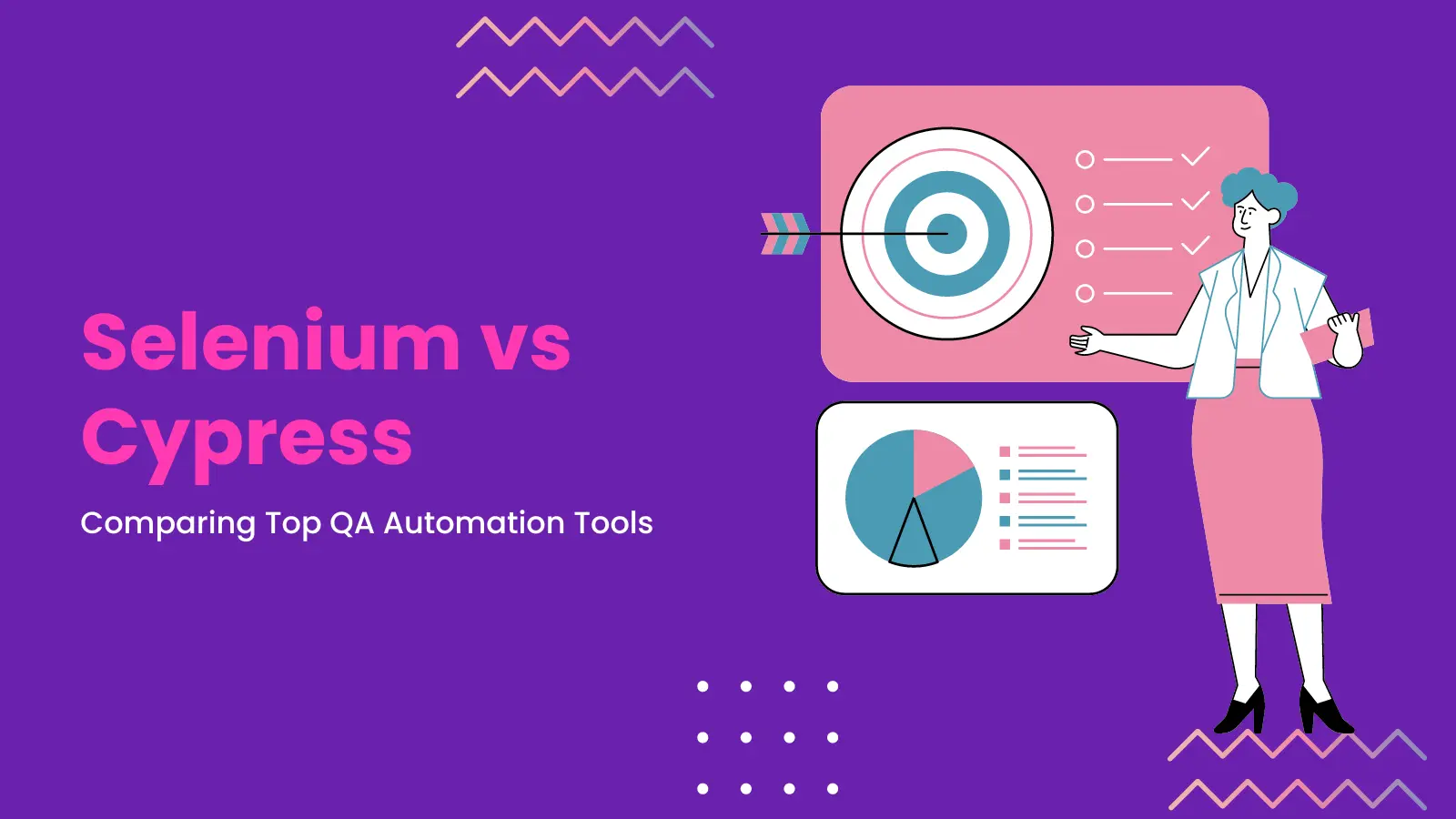Table of Contents
Test automation is a key for the software development process to ensure excellence. Therefore, selecting the right QA testing tool, be it Selenium vs Cypress, is vital. Understanding and comparing both testing tools will help you identify which tool would meet your requirements.
In this article, we will particularly focus on the evolving scenarios from Selenium to Cypress, the two of the most common frameworks for testing web-based applications.
What is Selenium?
Introduced in 2004, Selenium is a revolutionary tool in web application automation testing. It is an open-source framework. Selenium supports several programming languages, such as Python, C#, Java, Ruby, and many more. The key functionalities in the Selenium testing tool encompass:
Cross-browser compatibility Testing
Selenium supports testing across a wider range of browsers, such as Firefox, Edge, Chrome, and Safari, ensuring outstanding user experience across every platform.
Testing Framework Integration
Selenium automation testing tool integrates with common testing frameworks like TestNG for Java, JUnit, and Pytest for Python, enabling a structured testing approach.
Browser Automation
Selenium mimics user interactions in a web browser, for example clicking buttons, navigating web pages and entering text.
Limitations of Selenium Automation Testing Tool
But not all is rosy about selenium. There are some bottlenecks surrounding Selenium automation, too. Let’s discuss them.
Maintenance
Web driver compatibility across several browsers and versions needs to be maintained, which further consumes time.
Complexity
Typically, Selenium needs browser-specific drivers. Above all, it requires writing test scripts, which can be difficult for beginners.
Lack of functionalities
Selenium fundamentally focuses on user interface testing. Therefore, additional tools might be required for API testing.
Cypress Automation Testing Tool for Quality Assurance
Cypress was introduced in 2011 with a fresh perspective toward web-based application testing. Compared to the Selenium automation testing tool, Cypress is an advanced testing framework developed on top of Node.js.
Cypress testing automation tool comes with features such as:
Designed for Developers
Cypress pays attention to developer experience and features user-friendly interface, debugging tools, and real-time feedback on test execution.
Easy Configuration
Unlike Selenium, Cypress requires minimal setup processes. It can handle browser devices internally and helps streamline configuration quickly.
In-built features
Cypress possesses more advanced functionalities than the Selenium automation testing tool. It features end-to-end testing, visual regression testing, and API testing.
Quick Test Execution
Cypress uses a unique framework for quick text execution compared to Selenium. It further enables quick feedback cycles.
Challenges While Using Cypress Automation Testing Tool
Even though Cypress has unique features compared to Selenium, it is not free from limitations. Let’s see some of the downsides of Cypress testing tool.
Supports Only a Few Languages
Cypress can support JavaScript for writing test scripts. It may limit its adoption among developers who use other programming languages.
Fewer External Integrations
Cypress possesses built-in features. However, it is difficult to integrate third-party frameworks when compared to Selenium.
Lack of Features
Cypress is rather a new testing tool compared to Selenium. Even though it is evolving over time, it lacks a few of the unique features of Selenium. Plus, it does not have as much community support as Selenium.
How To Select the Right Automation Testing Tool: Selenium or Cypress
How do you make the choice? Is it selenium or cypress? The answer depends on several factors, such as your project’s requirements, your team’s expertise, and the needed functionalities. Here is a compilation of certain deciding factors that help you make the best choice between Selenium and Cypress.
Selenium supports your QA testing process under the following circumstances:
You require vast language support
Selenium supports a wide range of programming languages, empowering diverse development teams to automate testing.
You have an established Selenium framework
If your team is already invested in a Selenium-based testing framework, it would be difficult to make a switch.
You have to address complex testing requirements
Selenium possesses the capability to integrate with other testing tools for functionalities. It covers many aspects other than fundamental user interface testing.
When should you use Cypress?
Here are some scenarios where you can use the Cypress QA automation tool for testing.
You Prioritize Developer-oriented Experience
Cypress is easy to configure, gives real-time feedback, and offers debugging tools for your development team.
You Consider Speed
Cypress is known for its quick execution features. Its streamlined workflow supports agile development processes.
Your Development is JavaScript-based
Cypress makes use of JavaScript to write test scripts. Therefore, make it choice for your development team.
The Future of Automation: What is after Selenium and Cypress?
The future of QA automation testing welcomes new approaches. Here are some of the cutting-edge trends in the QA automation landscape.
API-first Testing
As APIs rule modern applications, API testing will be a crucial aspect of quality assurance automation in the future.
AI Integration and AI integration
In the future, developers will use artificial intelligence to automate test case generation and rely on anomaly detection, and self-healing tests will also gain traction.
Cloud-based Testing Platforms
Cloud-based solutions provide better collaboration, scalability, and parallel execution, particularly for geographically dispersed teams.
Endnote on Selenium vs Cypress
Both Selenium vs Cypress play important roles in transforming web-based application testing. The software development ecosystem is constantly evolving, and therefore, automation testing tools are sure to adapt and incorporate new technologies.
However, selecting the right tool depends on the project’s requirements and your development team’s expertise. Selenium and Cypress have advantages and limitations. Selenium has established abilities that address advanced testing cases and support diverse development teams. Cypress is known for its developer-friendly feature. In the future, AI and API testing, together with these frameworks, will empower automation efficiency, considering the evolving nature of web applications.

